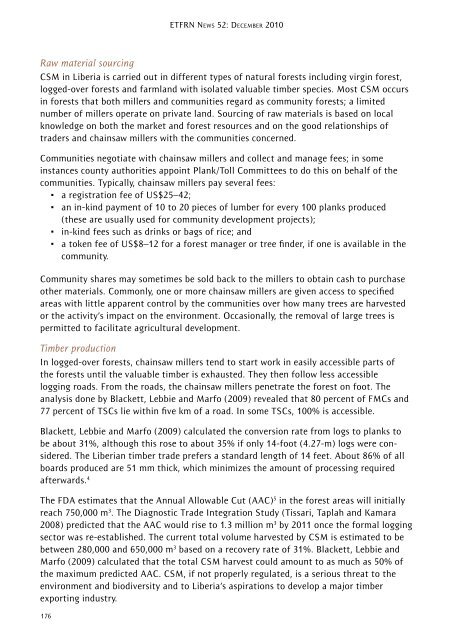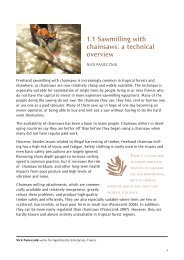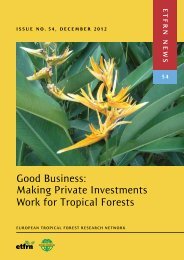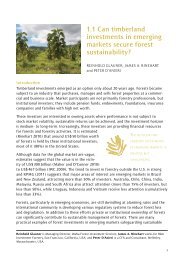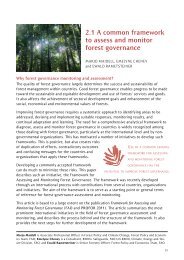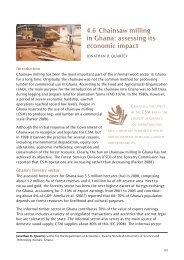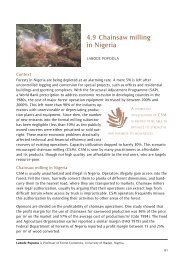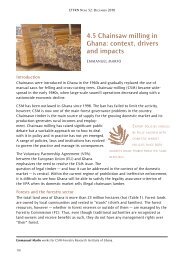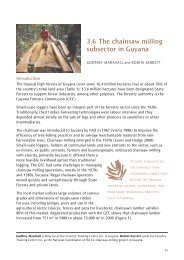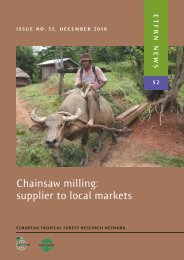Chainsaw milling: supplier to local markets - European Tropical ...
Chainsaw milling: supplier to local markets - European Tropical ...
Chainsaw milling: supplier to local markets - European Tropical ...
Create successful ePaper yourself
Turn your PDF publications into a flip-book with our unique Google optimized e-Paper software.
176<br />
ETFRN NEws 52: DEcEmbER 2010<br />
Raw material sourcing<br />
Csm in liberia is carried out in different types of natural forests including virgin forest,<br />
logged-over forests and farmland with isolated valuable timber species. most Csm occurs<br />
in forests that both millers and communities regard as community forests; a limited<br />
number of millers operate on private land. sourcing of raw materials is based on <strong>local</strong><br />
knowledge on both the market and forest resources and on the good relationships of<br />
traders and chainsaw millers with the communities concerned.<br />
Communities negotiate with chainsaw millers and collect and manage fees; in some<br />
instances county authorities appoint plank/Toll Committees <strong>to</strong> do this on behalf of the<br />
communities. Typically, chainsaw millers pay several fees:<br />
• a registration fee of us$25–42;<br />
• an in-kind payment of 10 <strong>to</strong> 20 pieces of lumber for every 100 planks produced<br />
(these are usually used for community development projects);<br />
• in-kind fees such as drinks or bags of rice; and<br />
• a <strong>to</strong>ken fee of us$8–12 for a forest manager or tree finder, if one is available in the<br />
community.<br />
Community shares may sometimes be sold back <strong>to</strong> the millers <strong>to</strong> obtain cash <strong>to</strong> purchase<br />
other materials. Commonly, one or more chainsaw millers are given access <strong>to</strong> specified<br />
areas with little apparent control by the communities over how many trees are harvested<br />
or the activity’s impact on the environment. occasionally, the removal of large trees is<br />
permitted <strong>to</strong> facilitate agricultural development.<br />
Timber production<br />
in logged-over forests, chainsaw millers tend <strong>to</strong> start work in easily accessible parts of<br />
the forests until the valuable timber is exhausted. They then follow less accessible<br />
logging roads. From the roads, the chainsaw millers penetrate the forest on foot. The<br />
analysis done by blackett, lebbie and marfo (2009) revealed that 80 percent of FmCs and<br />
77 percent of TsCs lie within five km of a road. in some TsCs, 100% is accessible.<br />
blackett, lebbie and marfo (2009) calculated the conversion rate from logs <strong>to</strong> planks <strong>to</strong><br />
be about 31%, although this rose <strong>to</strong> about 35% if only 14-foot (4.27-m) logs were considered.<br />
The liberian timber trade prefers a standard length of 14 feet. about 86% of all<br />
boards produced are 51 mm thick, which minimizes the amount of processing required<br />
afterwards. 4<br />
The FDa estimates that the annual allowable Cut (aaC) 5 in the forest areas will initially<br />
reach 750,000 m 3 . The Diagnostic Trade integration study (Tissari, Taplah and kamara<br />
2008) predicted that the aaC would rise <strong>to</strong> 1.3 million m 3 by 2011 once the formal logging<br />
sec<strong>to</strong>r was re-established. The current <strong>to</strong>tal volume harvested by Csm is estimated <strong>to</strong> be<br />
between 280,000 and 650,000 m 3 based on a recovery rate of 31%. blackett, lebbie and<br />
marfo (2009) calculated that the <strong>to</strong>tal Csm harvest could amount <strong>to</strong> as much as 50% of<br />
the maximum predicted aaC. Csm, if not properly regulated, is a serious threat <strong>to</strong> the<br />
environment and biodiversity and <strong>to</strong> liberia’s aspirations <strong>to</strong> develop a major timber<br />
exporting industry.


